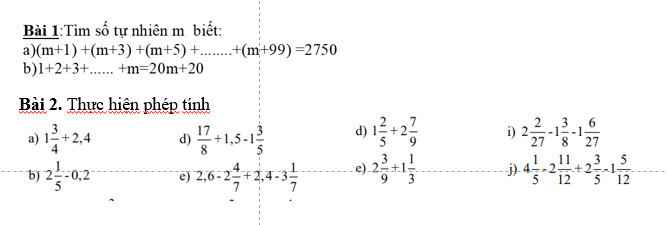Hỗ trợ em bài này ạ. Câu b thôi ạ.
Hãy nhập câu hỏi của bạn vào đây, nếu là tài khoản VIP, bạn sẽ được ưu tiên trả lời.


Với n=0 \(\Rightarrow\) phương trình có 2 nghiệm duy nhất là \(\left\{{}\begin{matrix}x=-\dfrac{1}{2}\\y=\dfrac{1}{2}\end{matrix}\right.\)
Với n \(\ne0\)
Để phương trình có nghiệm duy nhất \(\Leftrightarrow\dfrac{n}{2}\ne\dfrac{2}{n}\Rightarrow n^2\ne4\Rightarrow n\ne\pm2\)
Vậy hệ phương trình có nghiệm duy nhất \(\forall n\ne\pm2\)
cho mình hỏi có đúng với nghiệm nguyên không vì đề bài yêu cầu nghiệm nguyên ạ ?

Thực hiện lần lượt BĐT cô-si 3 số cho từng bộ 3 vế trái, ví dụ:
\(\dfrac{1}{a^3}+\dfrac{1}{b^3}+\dfrac{1}{c^3}\ge3\sqrt[3]{\dfrac{1}{a^3b^3c^3}}=\dfrac{3}{abc}\)
Làm tương tự, sau đó cộng vế và quy đồng vế phải là sẽ được BĐT cần chứng minh

Lời giải:
ĐK:.............
Đặt $\sqrt{2x^2+x+6}=a; \sqrt{x^2+x+2}=b$ với $a,b\geq 0$ thì PT trở thành:
$a+b=\frac{a^2-b^2}{x}$
$\Leftrightarrow (a+b)(\frac{a-b}{x}-1)=0$
Nếu $a+b=0$ thì do $a,b\geq 0$ nên $a=b=0$
$\Leftrightarrow \sqrt{2x^2+x+6}=\sqrt{x^2+x+2}=0$ (vô lý)
Nếu $\frac{a-b}{x}-1=0$
$\Leftrightarrow a-b=x$
$\Leftrightarrow \sqrt{2x^2+x+6}=\sqrt{x^2+x+2}+x$
$\Rightarrow 2x^2+x+6=2x^2+x+2+2x\sqrt{x^2+x+2}$ (bình phương 2 vế)
$\Leftrightarrow 2=x\sqrt{x^2+x+2}(1)$
$\Rightarrow 4=x^2(x^2+x+2)$
$\Leftrightarrow x^4+x^3+2x^2-4=0$
$\Leftrightarrow (x-1)(x^3+2x^2+4x+4)=0$
Từ $(1)$ ta có $x>0$. Do đó $x^3+2x^2+4x+4>0$ nên $x-1=0$
$\Rightarrow x=1$Vậy..........

a, - Thay m = 2 vào phương trình ta được :\(x+2\sqrt{x-1}-3=0\)
\(\Leftrightarrow2\sqrt{x-1}=3-x\)
\(\Leftrightarrow4\left(x-1\right)=x^2-6x+9\left(x\le3\right)\)
\(\Leftrightarrow4x-4=x^2-6x+9\)
\(\Leftrightarrow x^2-10x+13=0\)
\(\Leftrightarrow\)\(x=5\pm2\sqrt{3}\) ( TM )
b, Ta có : \(x+2\sqrt{x-1}-m^2+6m-11=0\)
\(\Leftrightarrow x-1+2\sqrt{x-1}+1-m^2+6m-11=0\)
\(\Leftrightarrow\left(\sqrt{x-1}-1\right)^2=m^2-6m+9+2=\left(m-3\right)^2+2\)
\(\Leftrightarrow\sqrt{x-1}-1=\pm\sqrt{\left(m-3\right)^2+2}\)
\(\Leftrightarrow\sqrt{x-1}=1\pm\sqrt{\left(m-3\right)^2+2}\)
\(\Leftrightarrow x=\left(1\pm\sqrt{\left(m-3\right)^2+2}\right)^2+1\ge1\) ( TM )
=> ĐPCM
a) Thay \(m=2\) vào phương trình
\(\Rightarrow x+2\sqrt{x-1}-3=0\)
\(\Leftrightarrow2\sqrt{x-1}=3-x\) \(\left(3\ge x\ge1\right)\)
\(\Rightarrow4x-4=9-6x+x^2\)
\(\Leftrightarrow x^2-10x+13=0\) \(\Leftrightarrow\left[{}\begin{matrix}x=5+2\sqrt{3}\left(loại\right)\\x=5-2\sqrt{3}\end{matrix}\right.\)
Vậy ...
b) Đặt \(\sqrt{x-1}=a\) \(\left(a\ge0\right)\)
\(\Rightarrow a^2+2a-m^2+6m-10=0\)
Ta có: \(\Delta'=m^2-6m+11\ge0\forall m\)
Vậy phương trình luôn có nghiệm với mọi m

Ta có: \(\dfrac{4\sqrt{x}}{3\left(x-\sqrt{x}+1\right)}=\dfrac{4\sqrt{x}}{3\left[\left(\sqrt{x}-\dfrac{1}{2}\right)^2+\dfrac{3}{4}\right]}\)
Lại có: \(4\sqrt{x}\ge0\) với mọi x
\(3\left[\left(\sqrt{x}-\dfrac{1}{2}\right)^2+\dfrac{3}{4}\right]>0\) với mọi x
\(\Rightarrow\) \(\dfrac{4\sqrt{x}}{3\left[\left(\sqrt{x}-\dfrac{1}{2}\right)^2+\dfrac{3}{4}\right]}\ge0\) với mọi x
Dấu "=" xảy ra \(\Leftrightarrow\) x = 0
Vậy ...
Chúc bn học tốt! (Mk ms nghĩ ra được GTNN thôi thông cảm!)
Còn tìm GTLN:
Ta có: \(\dfrac{4\sqrt{x}}{3\left(x-\sqrt{x}+1\right)}=\dfrac{4\sqrt{x}}{3\left[\left(\sqrt{x}-1\right)^2+\sqrt{x}\right]}\le\dfrac{4\sqrt{x}}{3\sqrt{x}}=\dfrac{4}{3}\)
Dấu "=" xảy ra \(\Leftrightarrow\) \(\sqrt{x}-1=0\) \(\Leftrightarrow\) x = 1
Vậy ...
Chúc bn học tốt!

CÁc số tròn chục nhỏ hơn 90 là :
10 ; 20 ; 30 ; 40 ; 50 ; 60 ; 70 ; 80
Tổng của các số tròn chục nhỏ hơn 90 là :
10 + 20 + ... + 80 = ( 80 + 10 ) x 8 : 2
= 90 x 8 : 2 = 720 : 2 = 360

Ta có bài toán quen thuộc sau:
Nếu \(\left(x+\sqrt{x^2+1}\right)\left(y+\sqrt{y^2+1}\right)=1\) thì \(x+y=0\)
Do đó từ giả thiết ta chỉ cần chứng minh được \(\left(x+\sqrt{x^2+1}\right)\left(y+\sqrt{y^2+1}\right)=1\) thì bài toán được giải quyết.
Đặt \(\left\{{}\begin{matrix}x+\sqrt{x^2+1}=a>0\\y+\sqrt{y^2+1}=b>0\end{matrix}\right.\) \(\Rightarrow\left\{{}\begin{matrix}\sqrt{x^2+1}=a-x\\\sqrt{y^2+1}=b-y\end{matrix}\right.\)
\(\Rightarrow\left\{{}\begin{matrix}x^2+1=a^2+x^2-2ax\\y^2+1=b^2+y^2-2by\end{matrix}\right.\) \(\Rightarrow\left\{{}\begin{matrix}2ax=a^2-1\\2by=b^2-1\end{matrix}\right.\)
\(\Rightarrow\left\{{}\begin{matrix}x=\dfrac{a^2-1}{2a}\\y=\dfrac{b^2-1}{2b}\end{matrix}\right.\)
Thế vào giả thiết:
\(\left(\dfrac{a^2-1}{2a}+\sqrt{1+\left(\dfrac{b^2-1}{2b}\right)^2}\right)\left(\dfrac{b^2-1}{2b}+\sqrt{1+\left(\dfrac{a^2-1}{2a}\right)^2}\right)=1\)
\(\Leftrightarrow\left(\dfrac{a^2-1}{2a}+\sqrt{\dfrac{\left(b^2+1\right)^2}{\left(2b\right)^2}}\right)\left(\dfrac{b^2-1}{2b}+\sqrt{\dfrac{\left(a^2+1\right)^2}{\left(2a\right)^2}}\right)=1\)
\(\Leftrightarrow\left(\dfrac{a+b}{2}+\dfrac{a-b}{2ab}\right)\left(\dfrac{a+b}{2}-\dfrac{a-b}{2ab}\right)=1\)
\(\Leftrightarrow\left(\dfrac{a+b}{2}\right)^2-\left(\dfrac{a-b}{2ab}\right)^2=1\) (1)
Chú ý rằng: \(1=\dfrac{4ab}{4ab}=\dfrac{\left(a+b\right)^2-\left(a-b\right)^2}{4ab}\)
Do đó (1) tương đương:
\(\left(\dfrac{a+b}{2}\right)^2-\dfrac{\left(a-b\right)^2}{\left(2ab\right)^2}=\dfrac{\left(a+b\right)^2}{4ab}-\dfrac{\left(a-b\right)^2}{4ab}\)
\(\Leftrightarrow\dfrac{\left(a+b\right)^2}{4}\left(1-\dfrac{1}{ab}\right)+\dfrac{\left(a-b\right)^2}{4ab}\left(1-\dfrac{1}{ab}\right)=0\)
\(\Leftrightarrow\left[\dfrac{\left(a+b\right)^2}{4}+\dfrac{\left(a-b\right)^2}{4ab}\right]\left(1-\dfrac{1}{ab}\right)=0\)
Do \(a;b>0\Rightarrow\dfrac{\left(a+b\right)^2}{4}+\dfrac{\left(a-b\right)^2}{4ab}>0\)
\(\Rightarrow1-\dfrac{1}{ab}=0\Leftrightarrow ab=1\)
Hay \(\left(x+\sqrt{x^2+1}\right)\left(y+\sqrt{y^2+1}\right)=1\)
\(\Rightarrow x+y=0\Rightarrow P=100\)

\(n_{CO_2}=\dfrac{17.6}{44}=0.4\left(mol\right)\)
\(n_{H_2O}=\dfrac{10.8}{18}=0.6\left(mol\right)\)
\(m_O=m_A-m_C-m_H=6-0.4\cdot12-0.6\cdot2=0\)
\(\text{A chứa : C và H}\)
\(CT:C_xH_y\)
\(x:y=0.4:1.2=1:3\)
\(CTnguyên:\left(CH_3\right)_n\)
\(M_A=15\cdot2=30\left(g\text{/}mol\right)\)
\(\Leftrightarrow15n=30\)
\(\Leftrightarrow n=2\)
\(CT:C_2H_6\)
\(\)





